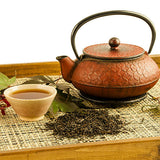Intro to Black Tea
Posted by Amy R at

This month we’re showcasing black tea. Like other true teas, black teas are made from leaves of the camellia sinensis plant. The difference between black teas and other types of teas is that the leaves have been withered, rolled, oxidized and fired in an oven. During this process, the color of the leaves turns from green to brown and black, and various of flavors are created.
The Chinese have produced green tea for thousands of years, while black tea is a relatively new tea. There is evidence that the Chinese first made black tea in the 1700s in the Wuyi mountains in Fujian province. In general Chinese black teas are more slowly oxidized than other black teas which creates a milder, sweeter black tea. We carry the following Chinese black teas:
In the mid 1800s the British began to grow tea in their colonies of India and Sri Lanka. They "stole" Chinese tea plants (more details in a future blog post) and planted them in the Darjeeling region in northeast India. In the Assam region, they also discovered another variety of tea plant with larger leaves called camellia sinensis assamica. Over time the British developed more machinery to mass produce tea which created "brisker" teas which do well with milk and sugar added. Since that time these teas have evolved to become more sophisticated in taste. Some of our Indian teas include:
In the mid 1800s tea plants were also brought to Ceylon, now called Sri Lanka. In the 1870s a blight wiped out their coffee plantations and they switched to growing tea. This is where Thomas Lipton began producing tea. One of our favorite everyday teas is the Kenilworth Ceylon.
As you can see, there is a wide range of black teas from the original producers of China. These days black tea is also produced in Kenya and many other countries. And of course, a limitless number of blends and flavored teas are made from combining black teas with each other, botanicals, other ingredients and flavors. You can see our full list of loose leaf black teas here.
Share this post
- Tags: black tea
